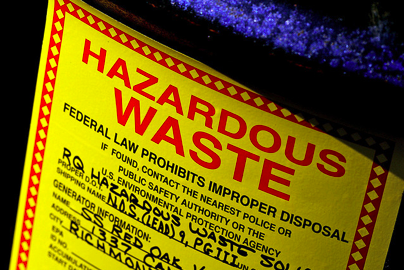One question we commonly hear is, “What should I do with used aerosol cans generated at my facility? Are they regulated as a hazardous waste?” Regulations on aerosol can disposal are different for commercial users than for residential users, and knowing the difference is key to complying with EPA and state regulations.
The used aerosol cans you have at home are excluded from the EPA’s definition of hazardous waste and do not need to be discarded in any particular way. However, when you generate them at a commercial or industrial facility, regulations from the EPA’s RCRA (Resource Conservation and Recovery Act) apply.
Federal Regulations
Which federal regulations apply to commercial aerosol containers depends in part on what’s inside them, and in part on what they’re made of. The applicable regulatory categories are Hazardous Waste and Scrap Metal.
Hazardous Waste
If the aerosol can originally contained a substance that is classified as a hazardous waste, then the can itself is also a hazardous waste, unless it can be emptied to less than 3% by weight of the total capacity of the container.
In addition, the propellant in most aerosol cans is classified as hazardous waste. Unless the can is completely emptied of propellant, regardless of the amount of substance remaining in the can, the can itself is considered a hazardous waste.
Scrap Metal
If an aerosol can has been punctured and drained completely of its contents, it meets the definition of scrap metal. Scrap metal that is empty and recycled is exempt from RCRA regulation, and does not qualify as hazardous waste. However, if it is not recycled, it is still subject to hazardous waste regulations.
State Regulations
Many states have adopted their own approaches to aerosol can disposal, so it is important to check your state’s regulations. For instance, California and Colorado classify aerosol cans as a universal waste, making them subject to a more stringent set of regulations. Florida does not have separate regulations for aerosol cans, so only federal guidelines must be met.
The Disposal Process Matters
If you intend to puncture, shred, or crush aerosol cans, the equipment used to conduct these activities must be safe and environmentally sound, and you must ensure no propellant is in the can. To ensure that your recycling program meets EPA requirements, you should contact the appropriate EPA Regional Office or an authorized state agency to inspect your facility and process.
How to Minimize Usage of Aerosol Cans
Collecting, managing, and disposing of used aerosol cans can be costly. You can minimize your disposal costs by phasing out aerosol cans and replacing them with reusable spray bottles or refillable pumps. If you must continue to use aerosol cans, reduce costs by educating employees to:
- Purchase only the amount needed.
- Use partially full containers until empty.
- Dispose of partially full or empty containers as directed by manufacturer’s label and safety data sheets.
For help in designing an EPA-approved aerosol can disposal process, contact one of GLE’s environmental engineering specialists today.



